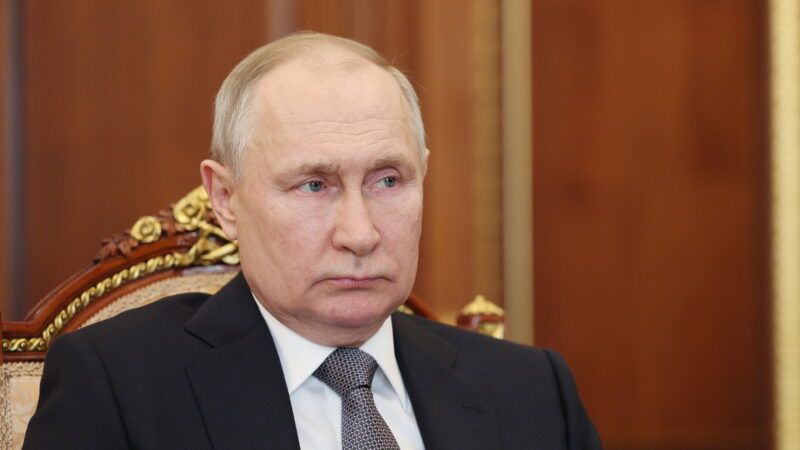Of Course Washington and Moscow Are Fighting a Proxy War
That doesn't mean Russia is right. It means we're being honest about how much the U.S. is involved.

This month's Discord leak of U.S. intelligence documents about the war in Ukraine has reignited a long-running debate about the conflict: Does U.S. aid to Kyiv amount to a proxy war against Russia?
The papers "illustrate how deeply the United States is involved in virtually every aspect of the war," wrote Washington Post senior national security correspondent Karen DeYoung in an able summary of the "proxy war" controversy. "The leaked documents confirm in detail that the United States is using its vast array of espionage and surveillance tools—including cutting-edge satellites and signals intelligence—to keep Kyiv ahead of Moscow's war plans and help them inflict Russian casualties." It's enough that, were three different countries involved in the same situation, we'd likely reach for the "proxy war" label with ease.
But the Biden administration has vehemently rejected the term on moral grounds. "We are not in a war with Russia, and we won't be in a war with Russia," DeYoung quotes Defense Secretary Lloyd Austin saying in an interview. His reasoning? The war "was Russia's choice to begin with."
So it was. But that says nothing about what the U.S. is doing, which by the administration's own account includes wanting "to see Russia weakened," and supporting the Ukrainian war effort—at a per-year price on par with the annual costs of the initial invasion and occupation of Afghanistan—for "as long as it takes."
Two things can be true at once here: The U.S. can admit that Russia is the aggressor, wholly in the wrong with this invasion, and admit that American involvement is extensive enough that the "proxy war" charge is at least plausible to reasonable people. Acknowledging the one does not negate the other—and false dichotomies won't move us toward greater understanding, prudent foreign policy, or peace.
Unfortunately, President Joe Biden's team isn't alone in this kind of thinking. The president's Republican critics are doing it too, albeit in mirror image. Former President Donald Trump, for example, has said the war is a U.S. "proxy battle" and Biden is only "pretending to fight for freedom" in Ukraine. But, again, it can be both: Ukraine really was invaded, and the Ukrainian people, especially in Russian-occupied territories, have suffered horrifying losses of life and liberty. That Washington also may have other, less idealistic motives for intervention doesn't make that cease to be the case.
This simplistic framing is particularly indefensible right now, just a month past the 20-year anniversary of the United States' invasion of Iraq. As many retrospectives recognized, there's no need to choose between ousted Iraqi dictator Saddam Hussein did awful things and should not have been in power and the U.S. should not have invaded Iraq to oust Saddam Hussein. How have we not absorbed that unmistakable lesson in the often-painful moral messiness of war?
Acknowledging and grappling with that complexity doesn't mean being a moral squish. It doesn't mean equivocation or cynicism or refusing to call things by their names. It means recognizing that even the U.S. military has limits to its capabilities, that even the most powerful nation on earth has finite power and must choose priorities among its possible uses, and that even America cannot police the world and forcibly remake it in its own image.
There's a reason, after all, that then–Secretary of State John Quincy Adams spoke of America not going "abroad in search of monsters to destroy" in his famous 1821 Independence Day address: There really are monsters. There are always monsters. The Russian invasion of Ukraine is monstrous.
That was Adams' whole point. If there weren't monsters abroad, there'd be no need to caution against going in search of them, no need to praise wise abstention "from interference in the concerns of others, even when [the] conflict [is] for principles to which [America] clings."
The "monsters" line is the most quoted part of Adams' speech, but in light of Ukraine and the proxy war debate, another piece bears revisiting, too. America "well knows that by once enlisting under other banners than her own, were they even the banners of foreign independence, she would involve herself beyond the power of extrication," Adams said, "in all the wars of interest and intrigue, of individual avarice, envy, and ambition, which assume the colors and usurp the standard of freedom."
That latter description doesn't ring true of the war in Ukraine—not on Ukraine's side, anyway. (Moscow, absurdly, has claimed its attack was defensive, which sounds a lot like the usurpation Adams had in mind.)
But the part about extrication is all too familiar. It points to questions we should already be asking about this conflict: Are there lines we won't cross? Are there circumstances under which the U.S. role would change? Will "as long as it takes" become "whatever it takes," especially if the presidency changes hands? What kind of accountability can we expect as the mission evolves—or, for that matter, as it stalemates?
The longer U.S. intervention in this war continues, the more unacceptable oversimplification and public "accountability" via leaks become—and the more we need realism and transparency from Washington.



Show Comments (47)